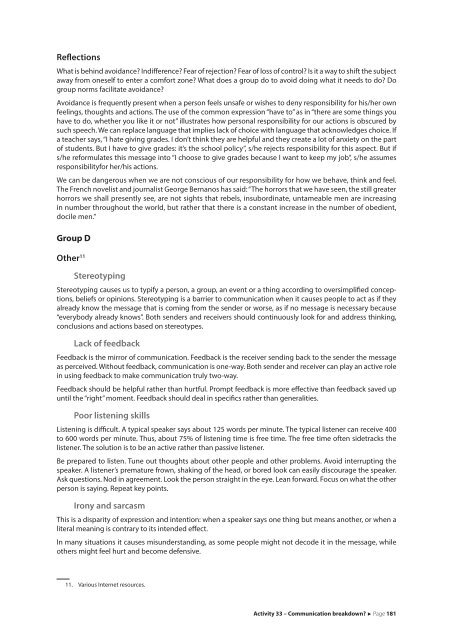TASKs for democracy
4NYw4W
4NYw4W
You also want an ePaper? Increase the reach of your titles
YUMPU automatically turns print PDFs into web optimized ePapers that Google loves.
Reflections<br />
What is behind avoidance? Indifference? Fear of rejection? Fear of loss of control? Is it a way to shift the subject<br />
away from oneself to enter a com<strong>for</strong>t zone? What does a group do to avoid doing what it needs to do? Do<br />
group norms facilitate avoidance?<br />
Avoidance is frequently present when a person feels unsafe or wishes to deny responsibility <strong>for</strong> his/her own<br />
feelings, thoughts and actions. The use of the common expression “have to” as in “there are some things you<br />
have to do, whether you like it or not” illustrates how personal responsibility <strong>for</strong> our actions is obscured by<br />
such speech. We can replace language that implies lack of choice with language that acknowledges choice. If<br />
a teacher says, “I hate giving grades. I don’t think they are helpful and they create a lot of anxiety on the part<br />
of students. But I have to give grades: it’s the school policy”, s/he rejects responsibility <strong>for</strong> this aspect. But if<br />
s/he re<strong>for</strong>mulates this message into “I choose to give grades because I want to keep my job”, s/he assumes<br />
responsibility<strong>for</strong> her/his actions.<br />
We can be dangerous when we are not conscious of our responsibility <strong>for</strong> how we behave, think and feel.<br />
The French novelist and journalist George Bernanos has said: “The horrors that we have seen, the still greater<br />
horrors we shall presently see, are not sights that rebels, insubordinate, untameable men are increasing<br />
in number throughout the world, but rather that there is a constant increase in the number of obedient,<br />
docile men.”<br />
Group D<br />
Other 11<br />
Stereotyping<br />
Stereotyping causes us to typify a person, a group, an event or a thing according to oversimplified conceptions,<br />
beliefs or opinions. Stereotyping is a barrier to communication when it causes people to act as if they<br />
already know the message that is coming from the sender or worse, as if no message is necessary because<br />
“everybody already knows”. Both senders and receivers should continuously look <strong>for</strong> and address thinking,<br />
conclusions and actions based on stereotypes.<br />
Lack of feedback<br />
Feedback is the mirror of communication. Feedback is the receiver sending back to the sender the message<br />
as perceived. Without feedback, communication is one-way. Both sender and receiver can play an active role<br />
in using feedback to make communication truly two-way.<br />
Feedback should be helpful rather than hurtful. Prompt feedback is more effective than feedback saved up<br />
until the “right” moment. Feedback should deal in specifics rather than generalities.<br />
Poor listening skills<br />
Listening is difficult. A typical speaker says about 125 words per minute. The typical listener can receive 400<br />
to 600 words per minute. Thus, about 75% of listening time is free time. The free time often sidetracks the<br />
listener. The solution is to be an active rather than passive listener.<br />
Be prepared to listen. Tune out thoughts about other people and other problems. Avoid interrupting the<br />
speaker. A listener’s premature frown, shaking of the head, or bored look can easily discourage the speaker.<br />
Ask questions. Nod in agreement. Look the person straight in the eye. Lean <strong>for</strong>ward. Focus on what the other<br />
person is saying. Repeat key points.<br />
Irony and sarcasm<br />
This is a disparity of expression and intention: when a speaker says one thing but means another, or when a<br />
literal meaning is contrary to its intended effect.<br />
In many situations it causes misunderstanding, as some people might not decode it in the message, while<br />
others might feel hurt and become defensive.<br />
11. Various Internet resources.<br />
Activity 33 – Communication breakdown? Page 181


